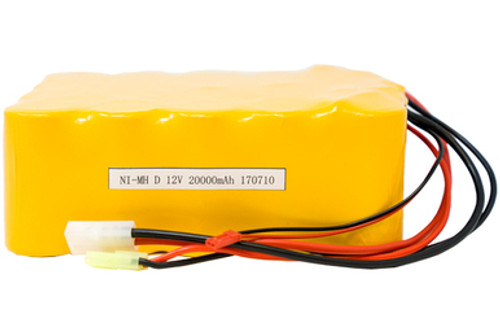12 Volt
-

Power Portable
12V 5Ah (60Wh) LiFePO4 Battery with LED Indicator (Replaces SLA 12V 4.5Ah)
$126.49As low as: -

-

-

Energizer
144-Pack Energizer A23 12 Volt Alkaline (72 Cards of 2)
Was: $339.99Now: $289.99As low as: -

-

Power Portable
12 Volt 20 Amp (240 WH) NiMH Battery Pack with Charge & Discharge Terminals
$346.49As low as: -

Power Portable
12V 25Ah (300Wh) LiFePO4 Battery with LED Indicator (Replaces SLA 12V 20Ah)
$399.99As low as:
12 VOLT BATTERIES
In the realm of portable power solutions, 12-volt batteries stand as versatile powerhouses, catering to a multitude of applications ranging from small electronics to automotive systems. Among the various options available, four types of batteries dominate the market: Alkaline, Nickel Metal Hydride (NiMH), Lithium Iron Phosphate (LiFePO4), and Lithium-ion.
Understanding Alkaline Batteries
Alkaline batteries are the most commonly used primary batteries, known for their reliability and affordability. They utilize an alkaline electrolyte and a zinc anode, providing a nominal voltage of 1.5 volts per cell.
Advantages of Alkaline Batteries:
Widely Available: Alkaline batteries are readily available in stores worldwide, making them a convenient choice for consumers.
Cost-Effective: They are relatively inexpensive compared to rechargeable batteries, making them suitable for one-time use applications.
Long Shelf Life: Alkaline batteries have a long shelf life and can be stored for several years without significant degradation.
High Energy Density: Alkaline batteries offer a high energy density, providing reliable power for a wide range of devices.
Applications of Alkaline Batteries:
Flashlights
Remote controls
Toys
Clocks
Smoke detectors
Exploring Nickel Metal Hydride (NiMH) Batteries
NiMH batteries are a popular choice for rechargeable applications, offering a good balance of performance and affordability. They use a nickel-based chemistry with a higher energy density compared to NiCd batteries. NiMH batteries typically provide a nominal voltage of 1.2 volts per cell and are available in various capacities.
Advantages of NiMH Batteries:
Rechargeable: NiMH batteries can be recharged hundreds of times, making them a cost-effective and eco-friendly choice.
Higher Energy Density: They offer a higher energy density compared to NiCd batteries, providing longer runtimes for portable devices.
No Memory Effect: NiMH batteries do not suffer from memory effect, allowing them to be recharged at any time without affecting performance.
Low Self-Discharge: Modern NiMH batteries have low self-discharge rates, allowing them to retain their charge for extended periods when not in use.
Applications of NiMH Batteries:
Digital cameras
Cordless phones
Portable audio players
Handheld gaming devices
Electric shavers
Lithium Iron Phosphate (LiFePO4) Batteries
LiFePO4 batteries are a type of lithium-ion battery known for their high energy density, long cycle life, and enhanced safety features. They utilize a lithium iron phosphate cathode, providing a nominal voltage of 3.2 volts per cell. LiFePO4 batteries are widely used in applications where reliability and durability are paramount.
Advantages of LiFePO4 Batteries:
Long Cycle Life: LiFePO4 batteries can withstand thousands of charge-discharge cycles, making them ideal for long-term use.
High Energy Density: They offer a higher energy density compared to other lithium-ion chemistries, providing more power in a compact package.
Enhanced Safety: LiFePO4 batteries have a lower risk of thermal runaway and fire compared to other lithium-ion batteries, making them safer for use in high-demand applications.
Wide Temperature Range: They perform well across a wide temperature range, making them suitable for outdoor and automotive applications.
Applications of LiFePO4 Batteries:
Electric vehicles
Solar energy storage systems
Marine propulsion
Portable power stations
Backup power systems
Exploring Lithium-ion Batteries
Lithium-ion batteries are the most common rechargeable batteries used in consumer electronics, known for their high energy density and lightweight design. They utilize a lithium cobalt oxide cathode and provide a nominal voltage of 3.7 volts per cell. Lithium-ion batteries offer excellent performance but require careful handling due to their sensitivity to overcharging and overheating.
Advantages of Lithium-ion Batteries:
High Energy Density: Lithium-ion batteries offer one of the highest energy densities of all rechargeable batteries, providing long runtimes for portable devices.
Lightweight and Compact: They are lightweight and have a compact design, making them ideal for portable electronics and mobile applications.
Fast Charging: Lithium-ion batteries support fast charging, allowing for quick recharge times compared to other rechargeable batteries.
Versatility: They are used in a wide range of applications, from smartphones and laptops to electric vehicles and power tools.
12-volt batteries play a crucial role in powering a wide range of devices and systems, offering diverse options to meet various requirements. Whether you opt for the reliability and affordability of alkaline batteries, the versatility of NiMH batteries, the performance and durability of LiFePO4 batteries, or the high energy density of lithium-ion batteries, you can rest assured that you're investing in a dependable power source for your applications.

